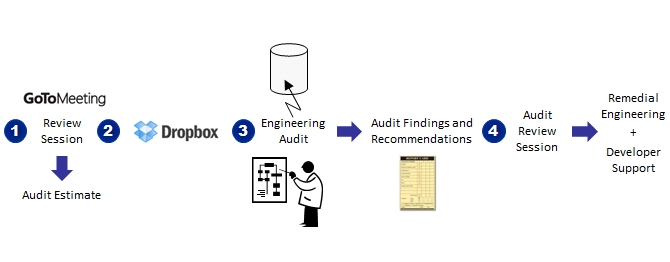SQL Server Efficiency, Reliability and Performance
SQL Server applications are often comprised of a large number of inter-related and complex moving parts —
table structures, referential integrity rules and constraints, indexes, stored procedures, views, user-defined functions, etc. — all required to work
reliably and efficiently, in combination with application-side forms, report queries, 3rd-party controls, web services, and a properly configured
database server with adequate network resources.
Most custom-built SQL Server systems suffer from poor design choices and improper coding techniques, and are the
root-cause behind poor performance, reliability, data integrity, and security (and privileged-use) vulnerabilities.
Issues such as record locking, duplicate records, slow performance, etc. can almost always be traced to deficiencies in the SQL Server database design itself, and/or the absence or misuse of proper
SQL Server engineering methods.
It is very common for developers to invest lots of "down time" troubleshooting problems and bugs
that are very difficult to pin down due to underlying design and implementation deficiencies.
While SQL Server design and implementations vary widely (depending upon developer experience), the end result is usually the same — the quality
and performance of the system degrades, and the effort and cost to maintain and extend the system increases.
This is when it makes sense to call a "time out," and have expert SQL Server engineering professionals take a close look at your
SQL Server database, to identify and remediate underlying issues.
PCA expert SQL engineering professionals employ a
standard check-list of SQL Server design and implementation methods — in
combination with many years of experience and advanced database analytics tools — to identify root-cause
issues behind poor SQL database performance, reliability, data integrity, security, and overall maintainability of the system.
The SQL Audit Process
Following a GoToMeeting session to review your system, and address key questions or concerns you may have, the first step in our
standard SQL Audit process — expert SQL Server Engineers will perform independent assessments of your database design
and implementation. PCA employs a proprietary "SQL Audit Engine" we designed to facilitate audit coverage and efficiency,
and capture important qualitative and quantitative measures. Once our Engineers have
completed their assessments, we meet as a team to review the independent findings, reconcile any gaps or incongruities, and
develop and deliver a consensus audit document. The final step is a
review session with your team, to insure that all of our audit findings and recommendations are fully understood, and to address
specific questions and concerns.

PCA SQL Audits are fully documented. Clients deliverables include a high-level management
overview that describes the audit scope, summary findings and key recommendations, and source engineering audit details
including specific observations, area(s) of impact, severity, and remedial engineering methods.